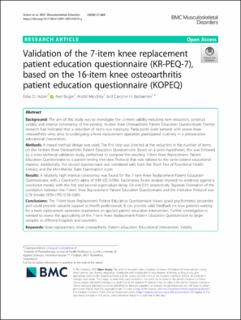Please use this identifier to cite or link to this item:
https://doi.org/10.21256/zhaw-26227| Publication type: | Article in scientific journal |
| Type of review: | Peer review (publication) |
| Title: | Validation of the 7-item knee replacement patient education questionnaire (KR-PEQ-7), based on the 16-item knee osteoarthritis patient education questionnaire (KOPEQ) |
| Authors: | Huber, Erika O. Boger, Axel Meichtry, André Bastiaenen, Caroline H. Germaine |
| et. al: | No |
| DOI: | 10.1186/s12891-020-03476-y 10.21256/zhaw-26227 |
| Published in: | BMC Musculoskeletal Disorders |
| Volume(Issue): | 21 |
| Issue: | 468 |
| Issue Date: | 2020 |
| Publisher / Ed. Institution: | BioMed Central |
| ISSN: | 1471-2474 |
| Language: | English |
| Subjects: | Educational intervention; Knee osteoarthritis; Knee replacement; Patient education; Validity |
| Subject (DDC): | 616.7: Diseases of musculoskeletal system and orthopaedics |
| Abstract: | Background: The aim of this study was to investigate the content validity including item reduction, construct validity and internal consistency of the existing 16-item Knee Osteoarthritis Patient Education Questionnaire. Former research had indicated that a reduction of items was necessary. Participants were patients with severe knee osteoarthritis who, prior to undergoing a knee replacement operation, participated routinely in a preoperative educational intervention. Methods: A mixed method design was used. The first step was directed at the reduction in the number of items on the 16-item Knee Osteoarthritis Patient Education Questionnaire. Based on a priori hypotheses, this was followed by a cross-sectional validation study, performed to compare the resulting 7-item Knee Replacement Patient Education Questionnaire to a patient-testing Interview Protocol that was tailored to the same patient educational material. Additionally, the revised questionnaire was correlated with both the Short Test of Functional Health Literacy and the Mini-Mental State Examination score. Results: A relatively high internal consistency was found for the 7-item Knee Replacement Patient Education Questionnaire, with a Cronbach’s alpha of 0.84 (SE: 0.036). Explanatory factor analysis showed no evidence against a one-factor model, with the first and second eigenvalues being 3.8 and 0.31, respectively. Bayesian Estimation of the correlation between the 7-item Knee Replacement Patient Education Questionnaire and the Interview Protocol was 0.78 (mode) (95% HPD 0.58–0.89). Conclusions: The 7-item Knee Replacement Patient Education Questionnaire shows good psychometric properties and could provide valuable support to health professionals. It can provide valid feedback on how patients waiting for a knee replacement operation experience an applied patient education intervention. Further investigation is needed to assess the applicability of the 7-item Knee Replacement Patient Education Questionnaire to larger samples in different hospitals and countries. |
| URI: | https://digitalcollection.zhaw.ch/handle/11475/26227 |
| Fulltext version: | Published version |
| License (according to publishing contract): | CC BY 4.0: Attribution 4.0 International |
| Departement: | School of Health Sciences |
| Organisational Unit: | Institute of Physiotherapy (IPT) |
| Appears in collections: | Publikationen Gesundheit |
Files in This Item:
| File | Description | Size | Format | |
|---|---|---|---|---|
| 2020_Huber-etal_Validation-7-item-knee-replacement-patient-education-questionnaire_BMC.pdf | 1.06 MB | Adobe PDF |  View/Open |
Show full item record
Huber, E. O., Boger, A., Meichtry, A., & Bastiaenen, C. H. G. (2020). Validation of the 7-item knee replacement patient education questionnaire (KR-PEQ-7), based on the 16-item knee osteoarthritis patient education questionnaire (KOPEQ). BMC Musculoskeletal Disorders, 21(468). https://doi.org/10.1186/s12891-020-03476-y
Huber, E.O. et al. (2020) ‘Validation of the 7-item knee replacement patient education questionnaire (KR-PEQ-7), based on the 16-item knee osteoarthritis patient education questionnaire (KOPEQ)’, BMC Musculoskeletal Disorders, 21(468). Available at: https://doi.org/10.1186/s12891-020-03476-y.
E. O. Huber, A. Boger, A. Meichtry, and C. H. G. Bastiaenen, “Validation of the 7-item knee replacement patient education questionnaire (KR-PEQ-7), based on the 16-item knee osteoarthritis patient education questionnaire (KOPEQ),” BMC Musculoskeletal Disorders, vol. 21, no. 468, 2020, doi: 10.1186/s12891-020-03476-y.
HUBER, Erika O., Axel BOGER, André MEICHTRY und Caroline H. Germaine BASTIAENEN, 2020. Validation of the 7-item knee replacement patient education questionnaire (KR-PEQ-7), based on the 16-item knee osteoarthritis patient education questionnaire (KOPEQ). BMC Musculoskeletal Disorders. 2020. Bd. 21, Nr. 468. DOI 10.1186/s12891-020-03476-y
Huber, Erika O., Axel Boger, André Meichtry, and Caroline H. Germaine Bastiaenen. 2020. “Validation of the 7-Item Knee Replacement Patient Education Questionnaire (KR-PEQ-7), Based on the 16-Item Knee Osteoarthritis Patient Education Questionnaire (KOPEQ).” BMC Musculoskeletal Disorders 21 (468). https://doi.org/10.1186/s12891-020-03476-y.
Huber, Erika O., et al. “Validation of the 7-Item Knee Replacement Patient Education Questionnaire (KR-PEQ-7), Based on the 16-Item Knee Osteoarthritis Patient Education Questionnaire (KOPEQ).” BMC Musculoskeletal Disorders, vol. 21, no. 468, 2020, https://doi.org/10.1186/s12891-020-03476-y.
Items in DSpace are protected by copyright, with all rights reserved, unless otherwise indicated.